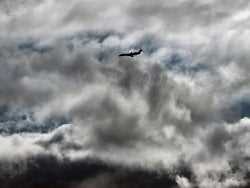Saturday, January 01, 2022
Disturbance of aircraft electronics?
US government wants to postpone 5G rollout
American telecommunications companies such as AT&T and Verizon are spending a lot of money on the new 5G cellular standard and are pressing for a quick introduction. But airlines and aircraft manufacturers warn of complications. The US government is mediating on their side.
The US government is pushing for a slight delay in the rollout of high-speed 5G internet for cell phones because of possible risks to aviation. Transport Secretary Pete Buttigieg and the head of the FAA, Steve Dickson, have called on the network operators AT&T and Verizon to postpone the introduction planned for January 5th for a maximum of two weeks. In addition, the introduction of the so-called C-band – i.e. a certain frequency range – around important airports should be restricted until the end of March in order to have enough time at the airports for necessary tests and upgrades.
In their appeal, Buttigieg and Dickson point out that if there is no postponement, especially in bad weather and poor visibility, there is a risk of “far-reaching and unacceptable interruption” to air traffic. This could lead to the diversion and cancellation of numerous flights and thus affect the entire air traffic.
Europe is around the problem
Telecommunications companies such as AT&T and Verizon have acquired the rights to use the radio frequencies for many billions of US dollars and are relying on rapid commissioning. The American aviation authority fears, however, that 5G technology can lead to interference with certain aircraft electronics. Above all, the effects on the aircraft’s radio altimeters would have to be checked, the FAA said shortly before Christmas.
The reason is that the radio frequencies that are to be used in the USA for 5G are quite close to those that are also used for aircraft altimeters. The two aircraft manufacturers Boeing and Airbus had therefore asked the US government to postpone the introduction of 5G mobile communications in the C-band spectrum.
The European Aviation Safety Agency (EASA) is also investigating whether 5G can interfere with the radio altimeters used in aviation. However, the 5G frequency bands in Europe are not as close as the one planned in the USA to the frequency band used by aircraft. So far, no incidents are known in Europe or can be derived from available technical data from aircraft and equipment manufacturers, said an EASA spokeswoman.
